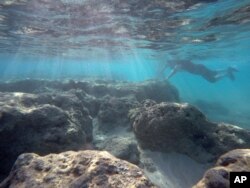Nico Pinault in Paris contributed to this report.
A United Nations report says 1 million plant and animal species are at risk of extinction, many within decades, because of human activity.
The report issued Monday draws on the work of 450 researchers from dozens of countries and warns the threatened mass extinction is "something that has never happened before in human history. ... Nature is globally declining at an unprecedented rate."
Scientists said species are going extinct up to several hundred times faster than the average rate during the past 10 million years. There are currently 8 million animal and plant species on Earth.
The 1,800-page report, which was released at the 7th session of the Intergovernmental Science-Policy Platform on Biodiversity and Ecosystem Services (IPBES) in Paris, said fixing the problem will require transformative changes.
Robert Watson, who chaired the 132-nation meeting, said, "We are eroding the very foundations of our economies, livelihoods, food security, health and quality-of-life worldwide. We really need to get governments to think beyond GDP."
Compiled over three years and based on 15,000 scientific papers, the report identified several main causes for the reduction in biodiversity, including turning forests into farms and developments, overfishing, and land and water pollution. The report also found that climate change is exacerbating the losses.
Some parts of the world, including coral reefs and the polar regions, feel the burden of lost biodiversity more than others, according to the report.
Scientists called for avoiding the worst effects by altering the way food and energy is produced, and better addressing waste.
Professor Eduardo Brondizio, an anthropologist at Indiana University Bloomington and the co-chairman of the assessment report produced in Paris, said the growth of cities in many poor countries is happening without needed government planning and oversight.
"Much of that urban extension happens without the ability for local governments to provide the services needed. You have a situation where low income, poverty are side by side with the lack of infrastructures, lack of sewage, etc."
Brondizio said countries by and large know what needs to be done to protect biodiversity, but said there needs to be a greater will to take action.
"The knowledge is there. We need to move to more bold implementation," he said.





